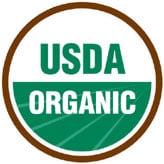FAQ’s About Organic Foods
Conventional vs. Organic Farming
- The word “organic” refers to the way farmers grow and process agricultural products, such as fruits, vegetables, grains, dairy products and meat. Organic farming practices are designed to encourage soil and water conservation and reduce pollution. Farmers who grow organic produce don’t use conventional methods to fertilize and control weeds. Examples of organic farming practices include using natural fertilizers to feed soil and plants, and using crop rotation or mulch to manage weeds.
Organic or not? Check the label
- The U.S. Department of Agriculture (USDA) has established an organic certification program that requires all organic foods to meet strict government standards. These standards regulate how such foods are grown, handled and processed. Any product labeled as organic must be USDA certified. Products certified 95 percent or more organic may display this USDA seal. Products that are completely organic — such as fruits, vegetables, eggs or other single-ingredient foods — are labeled 100 percent organic and can carry the USDA seal.
Do ‘organic’ and ‘natural’ mean the same thing?
- No, “natural” and “organic” are not interchangeable terms. You may see “natural” and other terms such as “all natural,” “free-range” or “hormone-free” on food labels. These descriptions must be truthful, but don’t confuse them with the term “organic.” Only foods that are grown and processed according to USDA organic standards can be labeled organic.
Organic food: Is it more nutritious?
- Probably not, but the answer isn’t yet clear. A recent study examined the past 50 years’ worth of scientific articles about the nutrient content of organic and conventional foods. The researchers concluded that organically and conventionally produced foodstuffs are not significantly different in their nutrient content.
Are there downsides to buying organic?
- One common concern with organic food is cost. Organic foods typically cost more than do their conventional counterparts. Higher prices are due, in part, to more-expensive farming practices. Because organic fruits and vegetables aren’t treated with waxes or preservatives, they may spoil faster. Also, some organic produce may look less than perfect — odd shapes, varying colors or smaller sizes. However, organic foods must meet the same quality and safety standards as those of conventional foods.
Sources:
Human Health Benefits of Eating Organic Foods
Category: Nutrition, Research and Statistics
